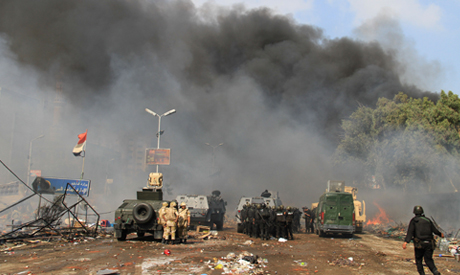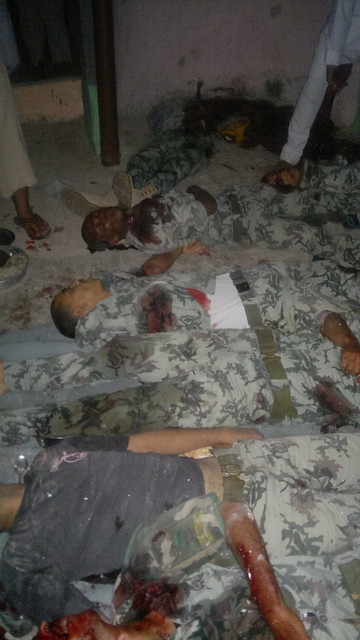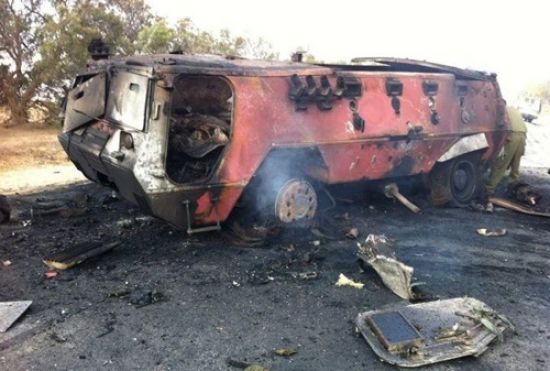Fact-finding committee formed to investigate violence after ouster Mohamed Morsi's promises 'politically neutral and balanced report'

Egyptian security forces inspect the sit-in camp set up by supporters of ousted Islamist president Mohamed Morsi in Nasr City
Omar Marawan, spokesman and secretary-general of the committee formed by Egypt's interim president Adly Mansour one year ago to investigate the violence after ousted Mohamed Morsi's, said on Monday that the committee will announce its final report in an international conference on Wednesday.

Egyptian security forces inspect the sit-in camp set up by supporters of ousted Islamist president Mohamed Morsi in Nasr City
Omar Marawan, spokesman and secretary-general of the committee formed by Egypt's interim president Adly Mansour one year ago to investigate the violence after ousted Mohamed Morsi's, said on Monday that the committee will announce its final report in an international conference on Wednesday.

Azza Mohamed, chairwoman of parliament's press office, told that local media, foreign correspondents and representatives of human rights organizations are invited to attend the conference, which will be held at 10am on Wednesday in the Shoura Council's main chamber.

"Foreign reporters are allowed to contact us and get prior permission to attend the conference on Wednesday," said Mohamed.
Marawan indicated that the conference comes after the committee finalized its work and held its last meeting on 20 November – or just one day before its mandate expired on 21 November.
The report includes 800 pages, with thousands of documents, CDs and photos attached, Marwan said. However, only 100 pages will be given to media reporters during the conference.
The committee's final report will be divided into five parts, covering 11 files.
"The first will comprise a preface, highlighting the committee's methods in investigating and researching events and its degree of neutrality," said Marwan. The second, entitled "The Road to 30 June," will offer a brief examination of events leading to the huge historical mass protests against Morsi on 30 June, 2013 and his removal from office on 3 July.
Marawan indicated that the conference comes after the committee finalized its work and held its last meeting on 20 November – or just one day before its mandate expired on 21 November.
The report includes 800 pages, with thousands of documents, CDs and photos attached, Marwan said. However, only 100 pages will be given to media reporters during the conference.
The committee's final report will be divided into five parts, covering 11 files.
"The first will comprise a preface, highlighting the committee's methods in investigating and researching events and its degree of neutrality," said Marwan. The second, entitled "The Road to 30 June," will offer a brief examination of events leading to the huge historical mass protests against Morsi on 30 June, 2013 and his removal from office on 3 July.

The most important part of the report, entitled "Gatherings and sit-ins in public squares and roads in Egypt," documents four major events: the dispersal of Muslim Brotherhood's sit-ins on 14 August, 2013, in which hundreds of Morsi supporters were killed, along with lesser numbers of policemen.

Marawan said the report was able to reach an almost exact death toll from the bloody dispersal of the above protest camps, popularly known as Rabaa Al-Adaweya and Nahda sit-ins.
"The report will give a complete list of the names of the victims from the dispersal's and where and how they were killed," said Marawan.
The report, said Marwan, also covers clashes in front of the Republican Guard headquarters in east Cairo's Nasr City district on 8 July, five days after Morsi's removal, and clashes between security forces and pro-Morsi supporters on nearby Nasr Street on 26 July.
Part four covers attacks against Coptic Christians in Upper Egypt after the dispersal's and the eruption of violence in North Sinai and Suez and in Egyptian prisons and universities.
Each part ends with a number of recommendations, while the fifth part will be entirely comprised of recommendations for the government and civil society.
Marawan promised that the committee will announce a politically neutral and balanced report.
Marawan disclosed that the committee's final meeting on 20 November was devoted to reviewing new information provided last week by foreign agencies on the events, particularly the disruption of the two Brotherhood sit-ins in Cairo and Giza.
"We reviewed this information and we will announce whether it was found valuable or not during the press conference," said Marawan.
Brotherhood leaders refused to testify before the committee, which they accused of bias and being a tool to polish the fake image of "the military coup" regime.
Marawan told journalists that the report tried to be as neutral as possible, presenting different points of view about the bloody events, including testimonies and documents provided by senior police and army officials and testimonies delivered by Brotherhood officials to the US-based Human Rights Watch and other sources, particularly the Qatari-based Al Jazeera satellite channel.
"The report will give a complete list of the names of the victims from the dispersal's and where and how they were killed," said Marawan.
The report, said Marwan, also covers clashes in front of the Republican Guard headquarters in east Cairo's Nasr City district on 8 July, five days after Morsi's removal, and clashes between security forces and pro-Morsi supporters on nearby Nasr Street on 26 July.
Part four covers attacks against Coptic Christians in Upper Egypt after the dispersal's and the eruption of violence in North Sinai and Suez and in Egyptian prisons and universities.
Each part ends with a number of recommendations, while the fifth part will be entirely comprised of recommendations for the government and civil society.
Marawan promised that the committee will announce a politically neutral and balanced report.
Marawan disclosed that the committee's final meeting on 20 November was devoted to reviewing new information provided last week by foreign agencies on the events, particularly the disruption of the two Brotherhood sit-ins in Cairo and Giza.
"We reviewed this information and we will announce whether it was found valuable or not during the press conference," said Marawan.
Brotherhood leaders refused to testify before the committee, which they accused of bias and being a tool to polish the fake image of "the military coup" regime.
Marawan told journalists that the report tried to be as neutral as possible, presenting different points of view about the bloody events, including testimonies and documents provided by senior police and army officials and testimonies delivered by Brotherhood officials to the US-based Human Rights Watch and other sources, particularly the Qatari-based Al Jazeera satellite channel.


Informed sources, however, told that the report accuses Islamists, including the Brotherhood and Al-Gamaa Al-Islamiya, for attacking Christians and churches in a number of Upper Egyptian governorates. It also accuses the militant group Ansar Beit Al-Maqdis (ABM) of orchestrating terrorist attacks against Egyptian police and army personnel in North Sinai after the dispersal's.







A source said the report pointed to increased cooperation between jihadist groups, particularly ABM and the Islamic State in Iraq and Syria (ISIS), also known as the Islamic State.







Informed sources said the report cited Mohamed El-Beltagy, a firebrand Brotherhood leader currently in jail for inciting violence against the military in Sinai. El-Beltagy vowed during the sit-in that "violence in Sinai will stop at the same second (President Abdel-Fattah) El-Sisi announces that Morsi will be back in office."

No comments:
Post a Comment
Note: Only a member of this blog may post a comment.